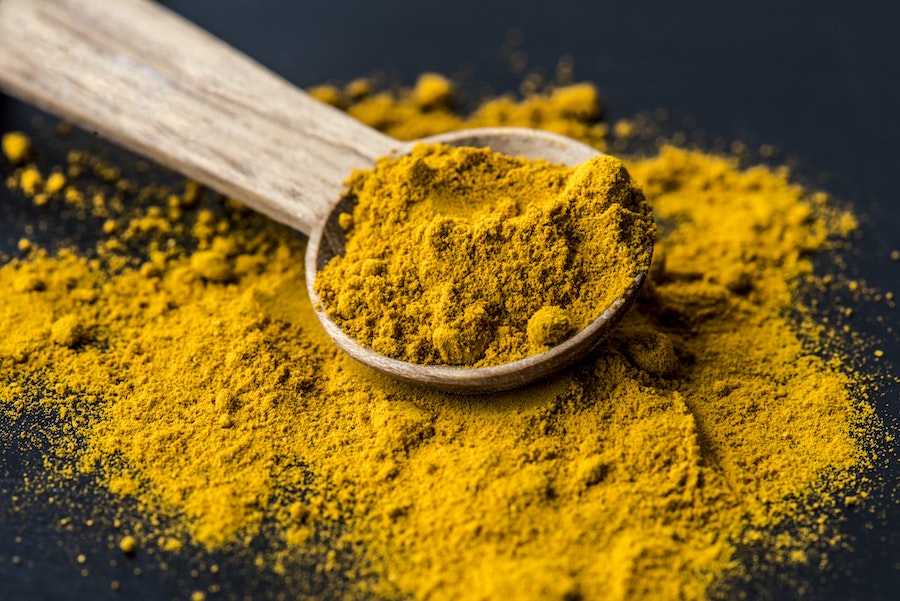5 reasons why turmeric is scientifically good for you
Spicy, golden and warm in flavour, turmeric’s therapeutic properties can ward of flu and boost your mood, says Liz Connor.
Like avocados, kale and chia seeds before it, turmeric is one of those cure-all ingredients that seems to have blown up out of nowhere.
Scroll through any millennial’s Instagram feed and you’ll likely spot a few riffs on the golden wonder spice; turmeric lattes, spicy rice, aromatic golden soup. According to a recent report by Waitrose, it’s even overtaken cinnamon as the most popular spice in our kitchen cupboards, while Google searches for it are up 75% in the last five years.
This potent plant of the ginger family grows wild in the forests of Southeast Asia, and has long been a staple in Pakistani, Indian, Persian and Thai diets.
But is it just a fad or are there actual benefits to the wonder spice? Here, we’ve found some science-backed reasons why you should tap into its healing potential.
1. It decreases inflammation
We’re all probably a little too familiar with joint pain, with arthritis affecting about 10 million people in the UK. Researchers have found that curcumin, the bright yellow chemical produced by turmeric, is capable of interacting with a variety of molecules involved in inflammation, easing swelling, aches and pains in the joints and muscles. In fact, a study published in the National Center for Biotechnology Information found that cucurmin may be just as effective as aspirin and ibuprofen at suppressing the body’s inflammatory response.
2. It has antioxidant effects
Antioxidants are pretty important substances; they protect your cells against the effects of free radicals – unpaired electrons that scavenge the body to seek out other electrons so they can become a pair. The damage caused by free radicals has been linked to premature ageing, a host of neurodegenerative diseases, and even cancer. As well as bolstering the body’s natural antioxidant function by increasing glutathione levels, studies have found curcumin’s molecular structure can even neutralise harmful free radicals in the body, lessening the chances of disease.

Fresh root turmeric
3. It can keep the heart healthy
Heart and circulatory disease causes more than a quarter of all deaths in the UK; that’s nearly 160,000 deaths each year at an average of one death every three minutes. Multiple studies have found that the yellow pigment in turmeric root can help to maintain the function of the interior lining of your blood vessels. One study published in the Nutrition Research journal in 2012 even found that curcumin may be as effective in improving vascular function in post-menopausal women as a moderate exercise routine.
4. It reduces the symptoms of depression
As well as being good for your heart and your joints, turmeric could also help to improve your mood. Research has shown that curcumin has a similar effect as antidepressants on patients suffering from depression, mood swings and anxiety, and studies on mice found that daily doses of turmeric can even increase the amount of happy hormones (serotonin and dopamine) in the brain.

A healthy drink made from turmeric roots, exotic spices with milk and honey
5. It boosts immunity
Thanks to its lipopolysaccharide content, turmeric can help stimulate the body’s immune system, helping you to avoid cold, flu and coughs. Its antibacterial, antiviral and anti-fungal agents also help to bolster immunity during the winter months. With winter clinging on a little longer than usual this year, try switching your morning coffee for a turmeric tea, to help give your immune system an extra boost.
The Press Association
Latest posts by The Press Association (see all)
- What causes an earwax blockage and how it can affect your hearing? - March 14, 2025
- 10 things you didn’t know about hoverflies - March 12, 2025
- When to replace old pillows – and how to dispose of them - March 11, 2025
- 5 things that not drinking enough water is doing to your health - March 11, 2025
- Here is the full playlist for the King’s Music Room show - March 10, 2025




















